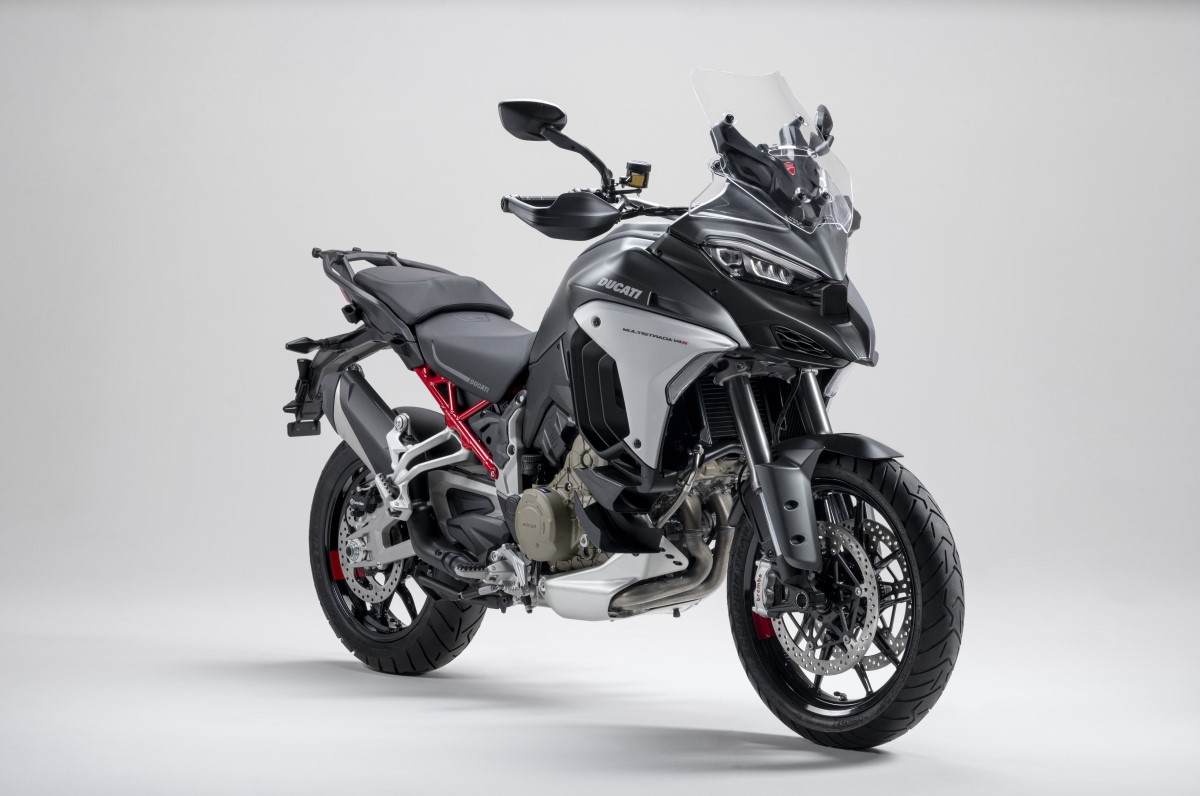Ducati Multistrada V4 revealed

Ducati has revealed its new Multistrada V4, which joins the Multistrada 1260 and Multistrada 950 in its ADV motorcycle line-up.
- Available in three variants - V4, V4 S and V4 S Sport.
- V4 engine makes 170hp and 125Nm
- First motorcycle with adaptive cruise control
Ducati Multistrada V4: Design
Visually, the Multistrada V4 shares a lot of styling elements with its L-twin siblings with a front-heavy profile and a small beak. A design element that's quite different towards the side is the layered air vent slits that look like fins. Ducati claims this offers improved aerodynamics and thermal comfort.
The company has said that the designers have worked on the proportions and compactness of the motorcycle body within the wheelbase, to favour the perfect combination of form and function.
Ducati Multistrada V4: Engine details
When the company says, record-breaking maintenance intervals, it’s talking about the impressive 60,000km interval between a valves check. This is double the distance than that of the V-twin powered Multistrada 1260. The huge service interval might come as a relief to many because people have always been concerned about big service bills.
The V4 Granturismo engine, misses out on the company’s Desmodromic valves and makes do with a spring valve return system, a change that has contributed to the huge service interval. Ducati has added that the engine has been tuned to improve the riding experience at lower revs. The company claims that its Euro 5 (BS6) compliant engine, makes 170 hp at 10,500rpm and maximum torque of 125Nm at 8,750rpm. For reference, the older 1,262cc, V-twin was capable of making 158hp at 9,500rpm and 128Nm at 7,500rpm.
At 66.7kg, the V4 Granturismo engine is 1.2kg lighter than the Testastretta twin-cylinder used on the previous Multistrada 1260. It's also 85mm shorter, 95mm lower and only 20mm wider. The company has also added cylinder deactivation, where the rear bank shuts off at idle to help reduce the heat felt by the rider and the pillion.
Ducati Multistrada V4: Electronics
The Ducati Multistrada V4 is loaded with electronics. The bike's Inertial Measurement Unit (IMU) manages the operation of cornering ABS, Ducati Wheelie Control (DWC), Ducati Traction Control (DTC), here in cornering version, and on the Multistrada V4 S, the Cornering Lights (DCL).
Also standard on the Multistrada V4 S is Vehicle Hold Control (VHC), which Ducati says makes it easy to restart on sloping roads. On the Multistrada V4 S, the inertial platform also communicates continuously with the semi-active Ducati Skyhook Suspension (DSS) control system with Autoleveling function.
However, the standout feature has to be the bike's front and rear radar system, which allows the use of Adaptive Cruise Control (ACC) and Blind Spot Detection (BSD). This is the first time we are seeing this tech on a production motorcycle.
Ducati Multistrada V4: Chassis
The Multistrada V4 is equipped with an aluminium monocoque frame, 19-inch front wheel and 17-inch rear wheel, capable of accommodating spoked wheels.
It has a wheelbase of 1,567mm and ground clearance of 220mm. The suspension travel, meanwhile, is 170mm at the front and 180mm at the rear. Ducati hasn't revealed the kerb weight yet, but the Multi V4 has a dry weight of 215kg. The fuel tank capacity is 22 litres.
Ducati Multistrada V4: Equipment
The Ducati Multistrada V4 S can be ordered with both alloy wheels and spoked wheels. This Multistrada is also available with new package configurations that can be ordered directly from the factory (Essential, Travel, Radar, Performance, Full). A complete breakdown of these packages is available on the Ducati website.
The top-spec Multistrada V4 S Sport offers a unique livery, Akrapovič exhaust and carbon-fibre front fender.
Ducati Multistrada V4: India launch
The Multistrada V4 will go on sale as early as the end of this month, but it is only expected to make its Indian debut early next year.
As for pricing, it will probably be more expensive than the Multistrada 1260, but by how much is yet to be confirmed.



No comments: